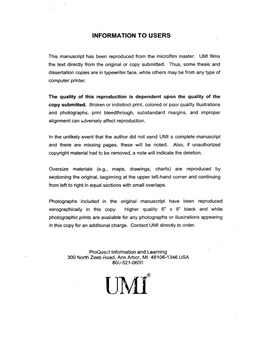| dc.contributor.advisor | Lusch, Robert F., | en_US |
| dc.contributor.author | O'brien, Matthew Patrick Sabbert. | en_US |
| dc.date.accessioned | 2013-08-16T12:18:19Z | |
| dc.date.available | 2013-08-16T12:18:19Z | |
| dc.date.issued | 2001 | en_US |
| dc.identifier.uri | https://hdl.handle.net/11244/339 | |
| dc.description.abstract | This dissertation develops theory and empirically tests developed hypotheses. A survey instrument is developed and administered to collect data for analysis. Primarily, the data was analyzed through regression analysis and multiple comparison procedures. The results from the quantitative analysis support many of the hypothesized relationships between performance evaluation and the key relational variables. | en_US |
| dc.description.abstract | The purpose of this study is to develop theory and investigate the potential role of the concept of organizational identification in the context of marketing channels. This study develops hypotheses built upon theory to determine how organizational identification impacts the relationship between the evaluation of a firm's performance by another firm and key relational variables. This research investigates the impact of the evaluation of exchange performance on key relational and outcome constructs in a variety of different ways. First, the nature of the relationship between the evaluations of performance and outcome variables is assessed for potential curvilinear effects. Second, the incremental effects of the impact of the exchange performance on outcome variables are assessed. Third, this study incorporates responses of the performance of exchange of products and services at the attribute level. Fourth, while studies have incorporated some of the above characteristics, none have incorporated these on the inter-organizational level, the context of the setting here. It is the primary goal of this study to address these concerns. Finally, to fully understand the role of organizational identification in a channels context, a qualitative investigation was performed to complement the findings from the theory development and testing above and to potentially extend theory. This study undertakes and presents findings from fieldwork investigating the concept of identification through depth interviews. | en_US |
| dc.description.abstract | Little attention has been paid to the simple question of whether or not exchange partners believe that they are in a relationship. As presented in this study, the concept of organizational identification begins to assess whether or not an exchange partner, in the context of a marketing channel, has this sense of belongingness with another exchange partner. | en_US |
| dc.description.abstract | The results from the analysis of the qualitative portion of the study indicate that the concept of organizational identification can be developed in numerous different ways. Additionally, the findings indicate that organizational identification may be utilized as a tool in attaining other personal goals. | en_US |
| dc.format.extent | xvi, 262 leaves : | en_US |
| dc.subject | Purchasing. | en_US |
| dc.subject | Exchange. | en_US |
| dc.subject | Business enterprises. | en_US |
| dc.subject | Relationship marketing. | en_US |
| dc.subject | Business Administration, Marketing. | en_US |
| dc.title | The role of organizational identification in marketing channels: A quantitative and qualitative assessment. | en_US |
| dc.type | Thesis | en_US |
| dc.thesis.degree | Ph.D. | en_US |
| dc.thesis.degreeDiscipline | Michael F. Price College of Business | en_US |
| dc.note | Director: Robert F. Lusch. | en_US |
| dc.note | Source: Dissertation Abstracts International, Volume: 62-05, Section: A, page: 1891. | en_US |
| ou.identifier | (UMI)AAI3014518 | en_US |
| ou.group | Michael F. Price College of Business | |
